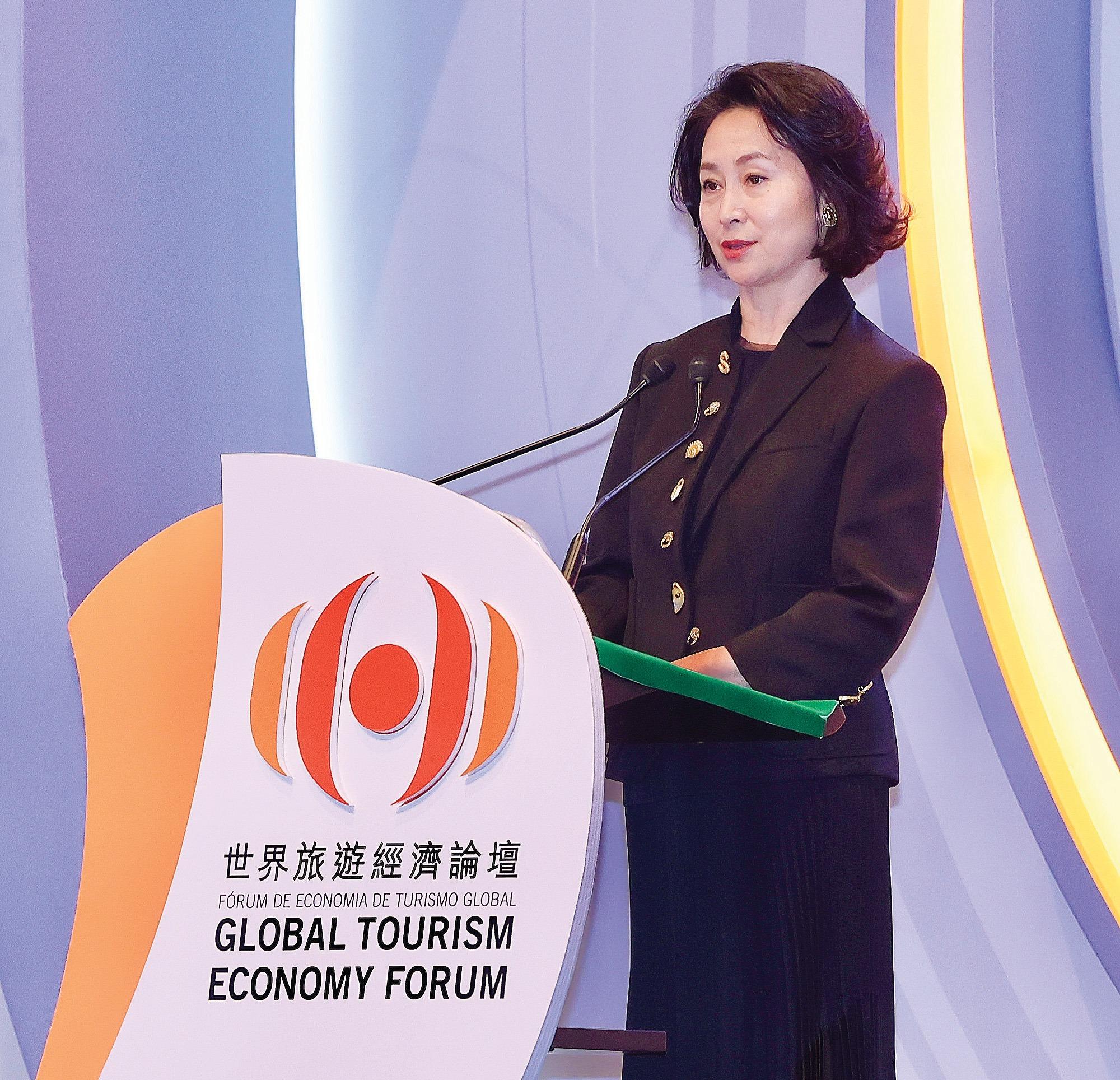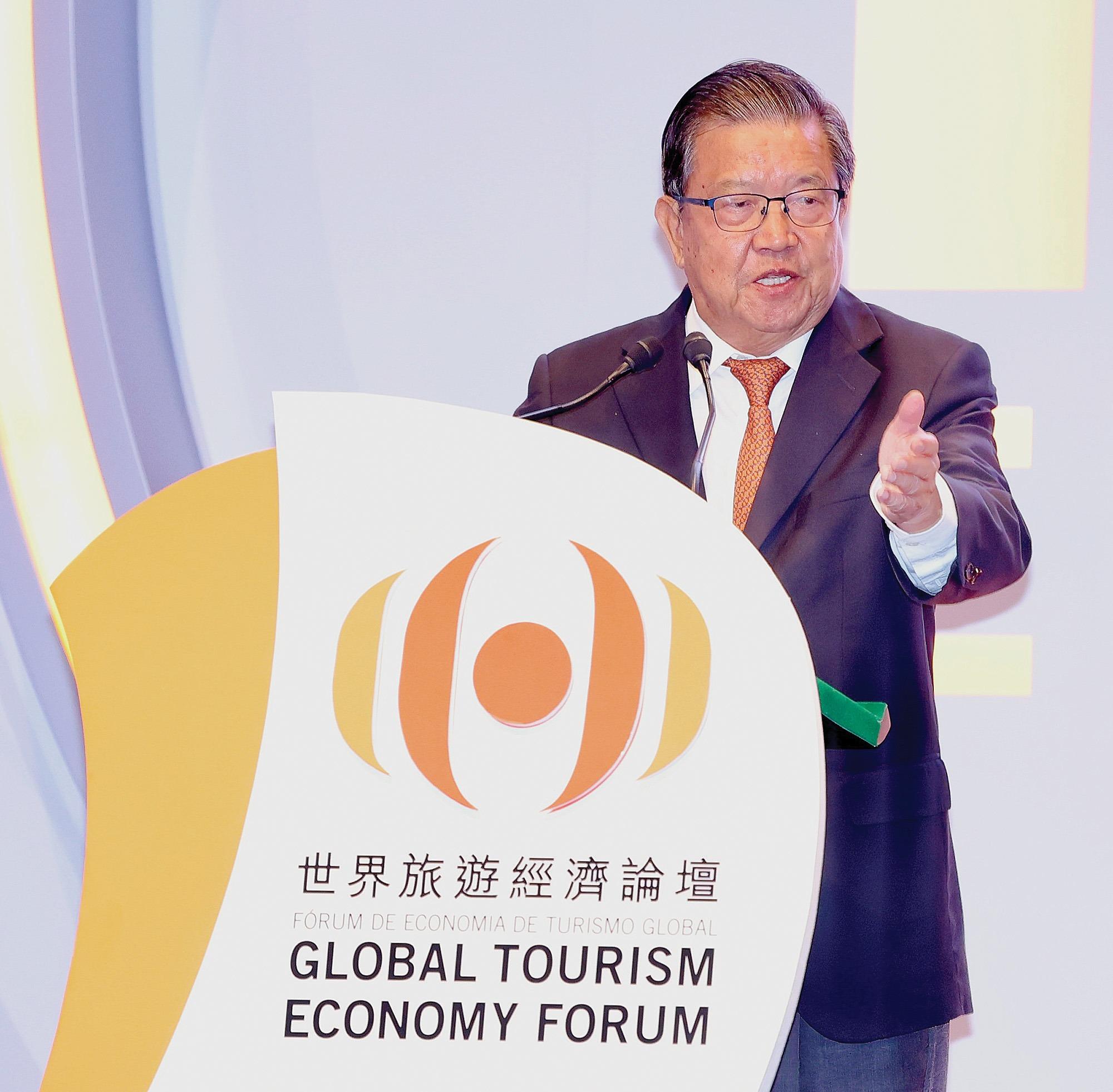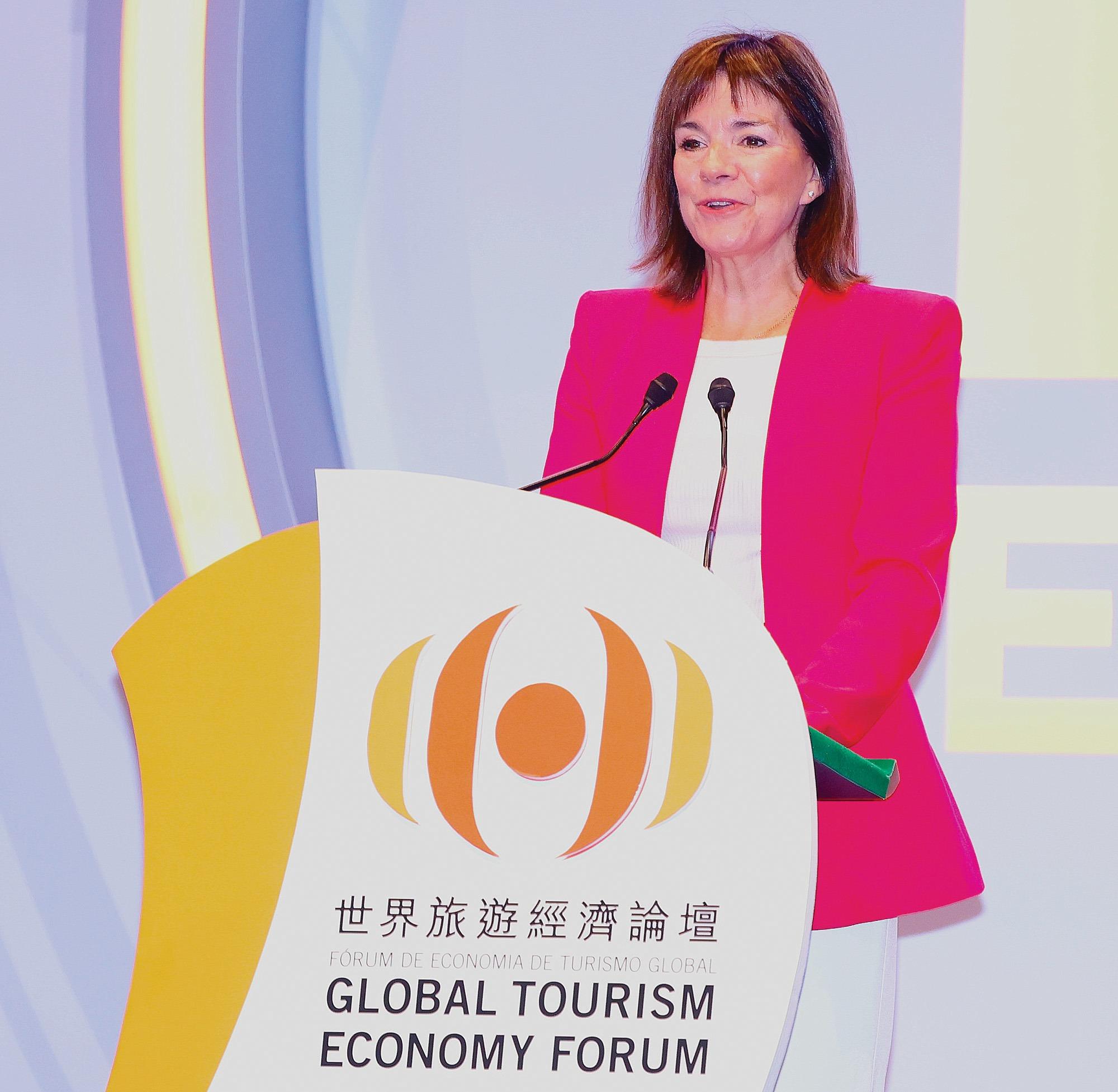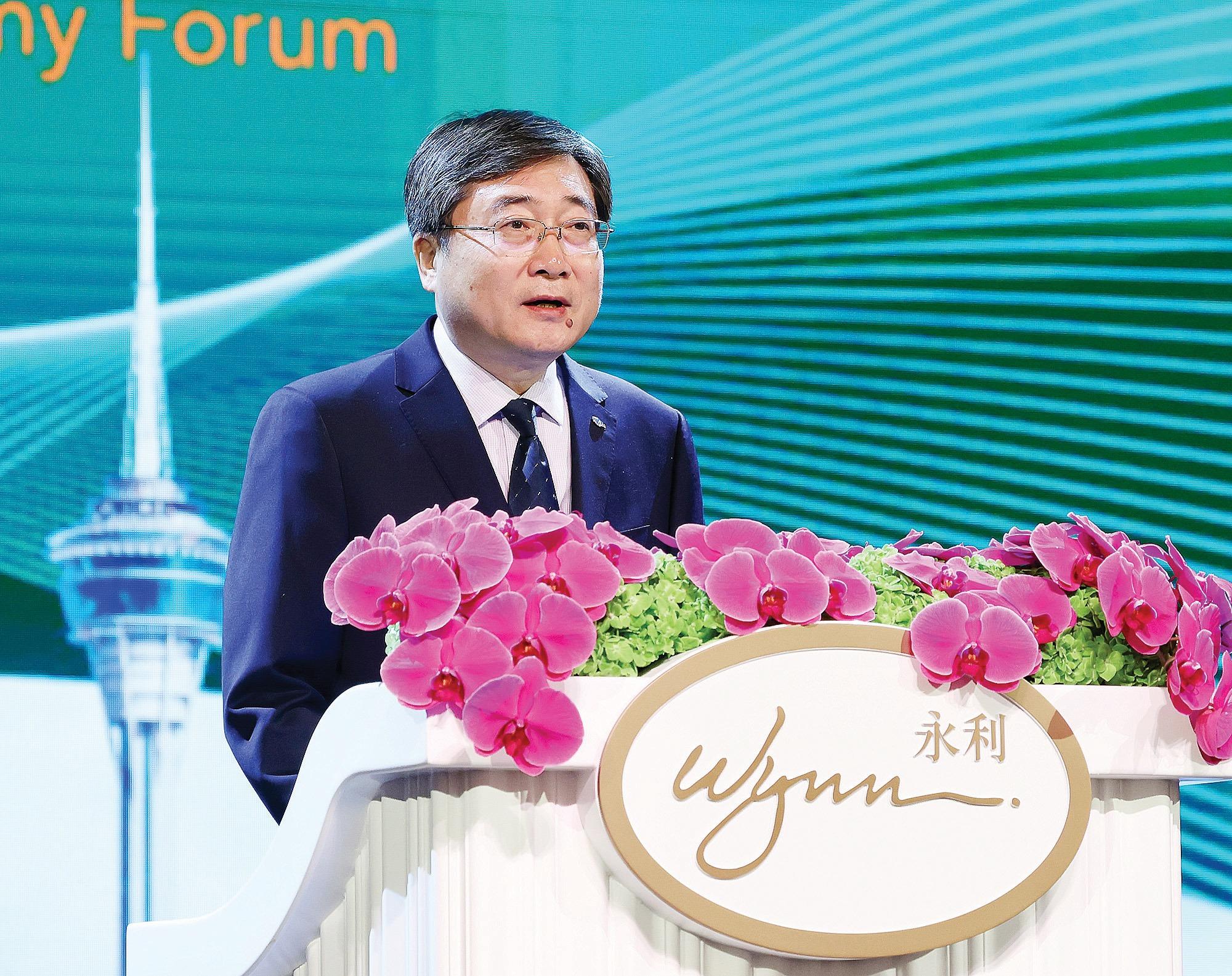 Pansy Ho Chiu-king, vice-chairman and secretary-general of the GTEF, delivers speech during the Global Tourism Economy Forum in Macao on Sept 21, 2023. (EDMOND TANG / CHINA DAILY)
Pansy Ho Chiu-king, vice-chairman and secretary-general of the GTEF, delivers speech during the Global Tourism Economy Forum in Macao on Sept 21, 2023. (EDMOND TANG / CHINA DAILY)
Tourism could serve as a catalyst for global economic recovery, and seeking common ground is key to the revival materializing, government officials and organizational leaders said at the Global Tourism Economy Forum in Macao on Thursday.
At the opening ceremony of the four-day event, Pansy Ho Chiu-king, vice-chairman and secretary-general of the GTEF, said collaboration between the tourism industry and various sectors, along with cooperation of different countries, will foster a dynamic economy.
Not seeking a trade surplus in travel services with any country or region is the fundamental guiding principle in formulating international tourism policies.
Dai Bin, president of the China Tourism Academy
She delivered a keynote speech to a group that included around 80 government officials and business leaders from around the world at the forum.
Ho used Macao’s tourism development as an example of the “tourism plus” concept. “Here, tourism has integrated and fostered the development of nongaming industries, propelling the development of emerging industries and formulating a diversified and energetic economy,” she said.
Over the past decade, the Macao forum has attracted 12,700 participants from over 90 countries with over 600 speakers, 72 global ministers, and brought together 552 organizations from different parts of the world representing different sectors.
These data show the significant impact of the Chinese market on the world. The market has grown more than threefold in the past 10 years, reaching 115 million outbound tourists at its peak, Ho added.
The GTEF has partnered with 37 countries and 16 Chinese cities and provincial-level areas over the past decade, this year featuring Italy as the partner country and Shanghai as the featured city.
Ho said these partnerships have enhanced the world’s understanding of China while creating development opportunities for the Chinese tourism industry.
The forum serves as a bridge between China’s private economy and the rest of the world. It proved to be “a vital step” in expanding the global tourism economy, Ho said.
 Long Yongtu, former vice-minister of the Ministry of Foreign Trade and Economic Cooperation (now the Ministry of Commerce), delivers speech during the Global Tourism Economy Forum in Macao on Sept 21, 2023. (EDMOND TANG / CHINA DAILY)
Long Yongtu, former vice-minister of the Ministry of Foreign Trade and Economic Cooperation (now the Ministry of Commerce), delivers speech during the Global Tourism Economy Forum in Macao on Sept 21, 2023. (EDMOND TANG / CHINA DAILY)
Broader perspective
Long Yongtu, former vice-minister of the Ministry of Foreign Trade and Economic Cooperation (now the Ministry of Commerce), said the tourism sector has been the most promising and fastest-recovering industry on the Chinese mainland in the post-pandemic period.
He is encouraging industry professionals to embrace innovation, making significant contributions to economic recovery by expanding domestic demand.
Tourism also helps to bridge the gap between the mainland’s rich and poor regions, said Long, who is also former secretary-general of the Boao Forum for Asia and honorary chairman of the GTEF.
He noted that rural tourism is gaining in popularity among Chinese tourists.
“In the less-developed central and western regions of the country, there is typically a scarcity of arable land but an abundance of labor resources. However, these areas are blessed with verdant mountains, lush greenery, and abundant tourism resources.
“By harnessing the potential of tourism development, rural areas can accelerate their growth, ultimately narrowing the gap in wealth between the eastern and western regions,” Long said.
The goal is to ensure that the tourism industry can drive high-quality development of the Chinese economy, Long concluded.
 Julia Simpson, president and CEO of the World Travel and Tourism Council, and honorary chairman of the GTEF, delivers speech during the Global Tourism Economy Forum in Macao on Sept 21, 2023. (EDMOND TANG / CHINA DAILY)
Julia Simpson, president and CEO of the World Travel and Tourism Council, and honorary chairman of the GTEF, delivers speech during the Global Tourism Economy Forum in Macao on Sept 21, 2023. (EDMOND TANG / CHINA DAILY)
A shot in the arm
In July and August, the booking volume of flight tickets to some of the hottest destinations on the mainland jumped 40 percent compared with the same period in 2019, and the booking volume of domestic hotels grew by 140 percent over 2019, according to Beijing-based online travel agency Qunar.
China Tourism Academy President Dai Bin said that from June to August, over 1.8 billion trips were made by domestic tourists, generating nearly 8 trillion yuan ($1.1 trillion) in tourism revenue.
He predicted that the upcoming eight-day Mid-Autumn Festival and National Day holidays will attract nearly 900 million domestic travelers.
“Not seeking a trade surplus in travel services with any country or region is the fundamental guiding principle in formulating international tourism policies,” Dai said.
China is accelerating its reengagement with global tourism by taking steps to reopen its inbound and outbound tourism sectors, he said. Dai also urged the authorities to implement streamlined visa, immigration, border control, and financial payment policies to facilitate smoother travel.
Julia Simpson, president and CEO of the World Travel and Tourism Council, and honorary chairman of the GTEF, said as governments lifted restrictions, spending by foreign visitors also rebounded by 80 percent after the yearslong pandemic.
 Zhang Xu, chairman of the World Tourism Alliance and honorary chairman of the GTEF, delivers speech during the Global Tourism Economy Forum in Macao on Sept 21, 2023. (EDMOND TANG / CHINA DAILY)
Zhang Xu, chairman of the World Tourism Alliance and honorary chairman of the GTEF, delivers speech during the Global Tourism Economy Forum in Macao on Sept 21, 2023. (EDMOND TANG / CHINA DAILY)
In the next decade, Simpson predicted that the tourism industry will generate $9.5 trillion in value, leading to the creation of 24 million jobs. By 2033, the sector is expected to contribute 11 percent of global GDP and employ 430 million individuals worldwide.
She noted that China boasts the world’s second-largest travel and tourism sector, valued at over $500 billion and creating over 62 million jobs.
Acknowledging the evolving landscape of the tourism sector, Simpson said travelers are no longer satisfied with passive sightseeing. They seek immersive experiences that allow them to connect with local cultures, engage in meaningful activities, and return home with a deeper understanding of the world, she said.
Advancements in technology will continue to shape the travel and tourism industry, Simpson said. However, it is crucial to address the challenges that come with technology, such as data privacy and security concerns. Striking a balance between innovation and safeguarding travelers’ rights and privacy will be essential, she added.
Zhang Xu, chairman of the World Tourism Alliance and honorary chairman of the forum, addressed the forum’s 10th anniversary lunch.


